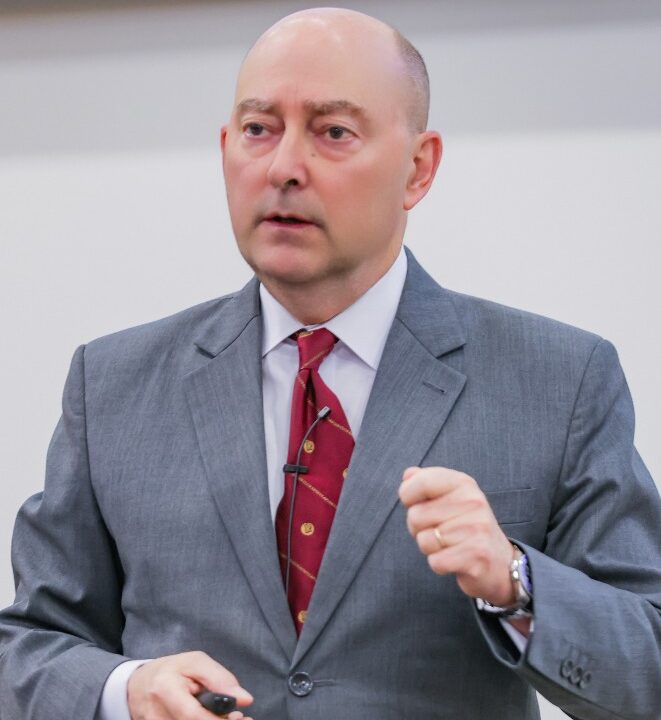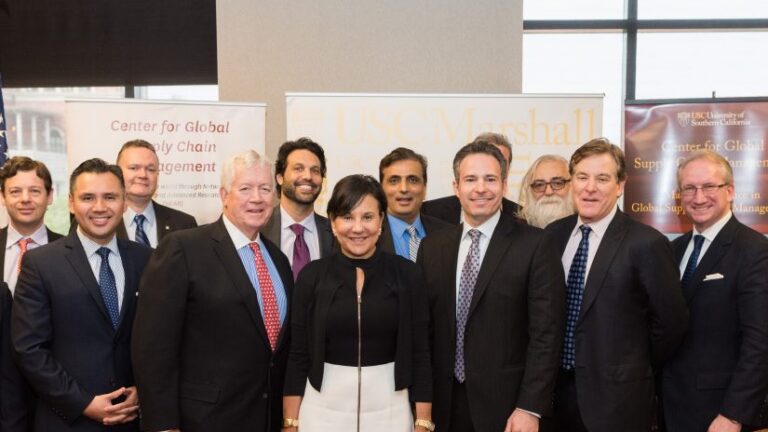
Admiral James Stavridis presents on US-China relations. (Courtesy of Terance Wolfe/USC Photo)
Naval Admiral Gives Talk on US-China Relations at USC Marshall
Four-star naval officer James Stavridis provided an overview of the volatile geopolitical situation between the U.S. and China.
Tensions between the United States and Chinese governments are at an all-time high. Though inextricably linked as trade partners, potential conflict simmers beneath the surface as concerns over Taiwan, chip and semiconductor manufacturing, and national security exacerbate the dynamic. President Biden and President Xi decry the prospects of war, but there’s no denying the fractured relationship between the world’s two great superpowers. The situation has left many asking: What can be done to prevent calamity?
On December 4th, representatives from the Shanghai Advanced Institute of Finance (SAIF) journeyed to Jill and Frank Fertitta Hall on USC’s campus for a conference on U.S.-China relations. The event was sponsored by Marshall Executive Education Office, who treated the predominantly Chinese audience to a keynote address from none other than retired Admiral James Stavridis.
Stavridis’ resumé more than qualifies him to comment on the U.S. and China. He’s a retired four-star admiral in the U.S. Navy and served as both the Commander of the U.S. Southern Command with responsibility for all military operations in Latin America from 2006 to 2009 and former Supreme Allied Commander of the NATO Alliance in global operations from 2009 to 2013. Throughout his 37-year military career, he’s earned over 50 medals, including 28 from foreign nations. In 2016, he was even vetted by Hillary Clinton as a potential running mate.
In front of a rapt audience listening to the Mandarin translation through earbuds, Stavridis presented on the United States, China, and how he envisions the powers finding common ground.
“The first thing both nations need to do may surprise you. You might think it’s military or diplomatic or economic or political,” Stavridis said. “The two nations need to listen, they need to listen to each other.”
The admiral also recognized the unique position in which China and the U.S. find themselves. Despite their fierce competition, they share more traits than they realize.
As the world’s two great economies, militaries, and cultures, the United States and China hold immeasurable influence over smaller nations, especially those engaged in conflicts of their own. Stavridis suggested the superpowers could lead on a number of issues, including eventually ending the wars in Gaza and Ukraine and even resolving the climate crisis.
“There is no path to solving climate [issues] that does not run through both Washington and Beijing,” Stavridis explained. “It’s another potential zone of cooperation.”
And yet, the political language around China has grown volatile. Both Republicans and Democrats proclaim the People’s Republic as the main threat to the American economy and national security. A 2023 Gallup Poll found just 15% of Americans view China favorably and the majority see the country as the United States’ greatest enemy.
Stavridis believes we all must remain vigilant of the situation.
“If we are not mindful of these tensions, even as we manage the relationship, we may be destined for war,” Stavridis said. “So we can listen more. We can study more and learn about each other’s countries.”
There are reasons to be hopeful. Nearly a month ago, Presidents Biden and Xi met near San Francisco for a wide-ranging discussion on the relationship between their two countries. The summit gave the admiral cautious optimism.
“I think we had a very positive event: the summit between President Xi and President Biden,” Stavridis said. “You see the two men, you feel a kind of a warmth between them.”
As far as Stavridis sees it, there are as many ways to avoid conflict as there are to fall into it. Militaries must be careful and base maneuvers on strict, defense-oriented protocol. Leaders must keep hotlines open to avoid miscalculations. Everyone from government officials to private citizens should read more about the conflict, the other country’s leadership, and the cultures. Even students have a role to play, according to the admiral:
“What you’re doing right now, the academic world — student exchanges — build a lot of the positive relationships. I think that both sides are to continue to invest on sending students,” Stavridis said.
Stavridis closed his address to the Chinese academics with a prediction and a hope:
“We will have tensions, we will have disagreements — over the South China Sea, over cyber, over naval maneuvers, over economics and tariffs. We will have disagreements, but I think we can find our way to working together.”



